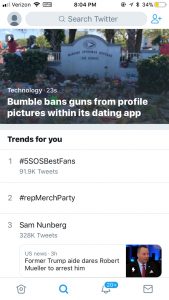VPN Use: Breaking the Code of Conduct

VPN allows students to access Snapchat using school wifi network.
Students at High School West are turning to the help of a VPN to access social media and other restricted sites with the school’s WiFi. With just a few clicks of their phone, students can bypass the entire Barracuda Web Security system and evade the filters set by the Half Hollow Hills School District.

A VPN, otherwise known as a Virtual Private Network, allows the user to access a network behind a firewall. Like a backdoor, a VPN enables students to browse restricted sites through an encryption that hides the IP address of the device. With the private wall, individuals are given the ability to have all the benefits of a WiFi beyond the range of restrictions. With a VPN, all internet activity is hidden behind a private network which is extended from the public network.
As today’s students grow up in a technologically advanced society, we often forget how easy it is for a young person to manipulate technology. With the utilization of VPNs, internet traffic is being concealed.
In recent years, Half Hollow Hills has implemented wireless internet connection for all students at High School West. This way, the internet could be used as an educational tool. This decision ultimately resulted in the Bring Your Own Device (BYOD) initiative. With this, kids are able to bring devices like smartphones and laptops to school for educational purposes. Alongside the wireless internet and BYOD came restrictions.
In order to beat the system, students have downloaded mobile versions of it through apps like Betternet and VPN 360. Some even pay for a VPN to access the school’s WiFi to its fullest extent through service providers like PureVPN, and a small handful even goes as far as making their own home networks.
Despite the growing use of these apps, many of the users at West aren’t aware of how the private network actually works. Through word of mouth, VPN related services have become popular to use apps like Instagram and Snapchat at school. In an interview with freshmen who have the app, all of them stated that they were not aware that it infringed on school guidelines.
A barrier stands between schools and social media, but with the help of a VPN, these walls are broken. However, with the use of these apps comes an infraction of protocol. The use of a VPN is in breach of the Internet User Agreement and the school’s code of conduct.
The Half Hollow Hills School District is mindful of the rise in these apps and declares, “We are aware that some students are using VPN applications or websites to gain unrestricted internet access while on Half Hollow Hills networks. It is important for all students to understand that any attempt to circumvent the Half Hollow Hills security and filtering system is a violation of the Internet Use Agreement that all students and parents signed as part of the Code of Conduct. If students are found to be utilizing a VPN or doing anything else that violates the Internet Use Agreement, they may be subject to disciplinary actions,” said John O’Farrell, Assistant Superintendent for Secondary Education.
Teens, now more than ever, are quick to find a loophole to their problems, but the downsides of these solutions are often left in the dark. Not only is this private network an issue at school, but even extends to the real world. According to Mr. Maroney, our very own Math and Computer Science teacher, the problem of VPNs goes beyond the scope of schools and starts to become an issue in the workplace. “Security at schools and businesses at large is a major obstacle as we continue to grow as a technological society. Students need to understand that they will be restricted when they get jobs after school and finding ways to bypass those securities will get them fired from many jobs.”
It is also important to know whether or not the VPN is reliable and trustworthy. A VPN service provider needs to be trusted because your data is going to the service and being encrypted. “We have already seen security businesses have problems, and I’m sure there will be more as we progress through the security issues of the internet,” said Mr. Maroney.
The Code of Conduct for High School West specifies, “Computer/electronic communications misuse, including any unauthorized use of computers, software, or Internet/Intranet account…” VPN use is considered a ‘disorderly conduct’ and is a transgression of both the Code of Conduct and Internet User Agreement students signed at the beginning of the year.
“The internet can be a great tool,” Dr. Catapano stated, ” but it can also serve to be a harmful one.”





